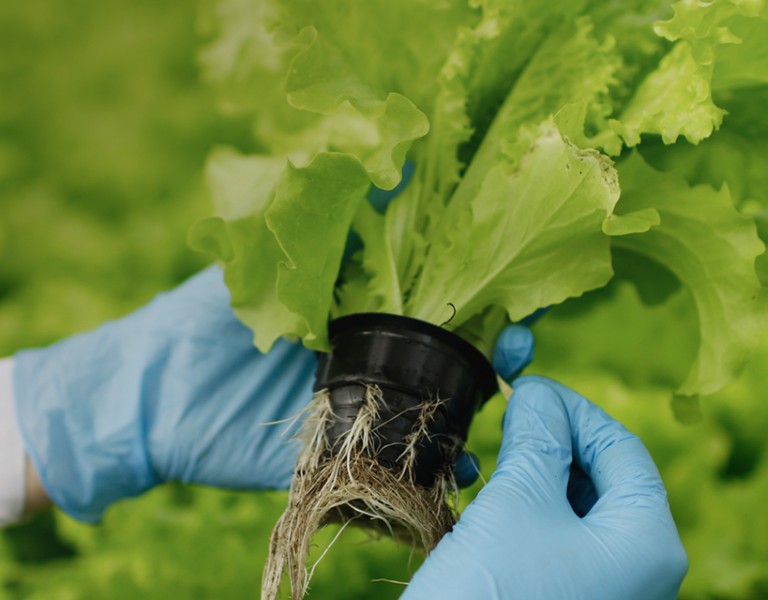The Blog in Brief
- Data is the food and beverage industry’s most underutilized defense against food waste, helping to spot supply chain failure risk before they hit and identify where waste is originating from – whether it’s sourcing, production, packaging or distribution.
- Industry-specific technology solutions can help drive manufacturing efficiency, generate cost-savings and reduce food waste.
- Addressing sustainability concerns not only make fiscal sense, but also helps address the issue of food waste that threatens the resilience of our food systems and mitigate the effects of climate change.
How does the food and beverage industry score on the sustainability scale?
The food and beverage industry has a lot on its plate. Given that the industry moves products through a complex supply chains and deals with perishables, the challenges that emerge are tremendous. Moreover, sourcing food brings its own set of issues with fertilizers, factory waste, and animal cruelty throwing light on the incredible environmental liability the industry has to bear.
The Food and Agriculture Organization of the United Nations (FAO) estimates that globally 870 million people do not have enough to eat while 14% of food ends up as waste. Numbers vary across developing and industrialized countries. In developing countries, food waste amounts to about USD 310 billion, even before it hits the market due to improper storage and transport. In industrialized countries, food waste equals approximately $680 billion and is largely generated at the retail level due to overproduction.
The human cost and ethical considerations of food waste aside, there is a negative impact on the planet. The food and beverage industry is notorious for greenhouse gas emissions and the use of large tracts of land for farming and raising livestock. It is an industry that has come under greater pressure as the global population continues to grow. With increasing food production and waste, there is an increase in demand for packaging (which in turn adds to the total waste associated with this industry).
Simple solutions that matter
Sustainability initiatives increasingly focus on biomass/ biofuel generation and composting as a way to utilize food waste. Other practices such as environmentally friendly packaging, government initiatives to reduce food waste, and promoting responsible consumption practices among consumers are also attempting to curtail waste in the food and beverage industry.
Another solution that targets food waste reduction is supply chain and inventory management. Food and beverage companies are driven by stakeholder pressure, government regulations, and their bottom line. Reducing food waste and smart inventory management to meet sustainability obligations may sound difficult, but with the right strategies, it becomes easier.
People, planet, and profits all deserve our attention equally. The wellbeing of people is a priority in the food and beverage industry; products must meet stringent health and safety standards. The industry is cognizant of the need to protect the planet, given its contribution to environmental degradation. And as with any industry, the competition is relentless. Meeting high sustainability standards and maintaining the trust of customers is one way of gaining the edge – and ensuring success for the longer term. The best way for companies to do so is to have the relevant information. The food and beverage industry can tap into the industry-specific capabilities of Infor M3 and CloudSuite Food and Beverage to address their specific concerns and challenges. Today’s consumer wants to learn more about the supply chain and how their food is produced. Given the economy’s volatility and inflation, along with changing dietary preferences, food and beverage manufacturers must be agile to introduce new products quickly. Food and beverage manufacturers also have to pay attention to safety processes and perform regular testing to ensure the high quality of their products.
An ERP empowers you to do all this and more. The end-to-end supply chain visibility afforded by an ERP allows you to improve your inventory management processes, manage the product lifecycle, and meet your food waste reduction targets. Managing supply and demand becomes less challenging with the right ERP solution and will help to simplify:
- Warehouse management – You can automate tasks such as product counting so that you have real-time, accurate data on all your product inventory. This will also help you to understand how many products eventually ended up as excesses (and contribute to food waste) compared to products that were sent to retail outlets.
- Sales forecasting – Generate sales forecasts based on historic buying patterns and incorporate seasonal and even weather conditions. This will further aid planning and scheduling as you have more insight into customer orders over time. Furthermore, you can use this information in your manufacturing processes to lower the likelihood of overproduction – which ultimately saves money and energy consumption for you, while limiting food waste.
- Traceability of raw materials – When you have more supply chain visibility, you can trace the origins of raw materials and understand if suppliers meet your food safety standards or not. This can help minimize the need for product recalls in the event of a contamination, which in turn helps avoid the chances of food going to waste. You can also ensure that you only order from suppliers who are in line with your sustainability commitments and quality standards.
These are some of the ways that an ERP solution can help you. Technology will provide you with a way to set clear targets for food waste reduction and help you achieve them in a cost-effective way. And while we cannot eliminate food waste entirely, we can certainly ensure we are doing our best for the people and planet through our business practices.
Doing more with less
When we talk about doing more with less, we are referring to leveraging technology and introducing a system that improves efficiencies in entire food and beverage supply chains. Considering this is really the source of most food waste, a smarter system not only reduces costs but also helps the planet. And here is where Industry 4.0 enters the discussion.
What technologies mark Industry 4.0?
- Machine Learning (ML)
- Artificial Intelligence (AI)
- Internet of Things (IoT)
- Automation
- Cloud solutions
Broadly speaking, Industry 4.0 will empower the food and beverage industry to increase productivity, improve food safety standards, reduce food waste, and have more visibility over their supply chains and inventory. It will also help with predictive analytics and maintenance. Think about it – more data to understand (or predict) factory outputs and identify inefficiencies; sensors to detect the freshness of raw materials and detect contaminants so that you only order what is fresh and enhance the quality of end products; automated temperature controls to reduce the amount of food that will go bad; and learn more about a machine’s functionality so factory managers are informed in advance about operational capacity and downtime. Equipped with the right data at the right time, executives can make better decisions.
According to one study, Businesses that miss out on these opportunities risk putting themselves on a financial backfoot. The right technology foundation will help you supervise the flow of goods from manufacturers and warehouses to the point of sales, and document the “what, where, and who” of the supply chain. To learn more about food waste and smart inventory management, listen to Fortude’s Colin Strang as he discusses how food and beverage manufacturers can turn to technology to better manage their inventory and reduce food waste: https://youtu.be/7hRKQdQeByg
This video is the final video in our three-part series about Industry 4.0 and sustainability in the food and beverage industry. Listen to part 1 and part 2 where we explore topics such as conscious consumerism, sustainability issues in the food and beverage industry, and supply chain transparency.
Subscribe to our blog to know all the things we do


